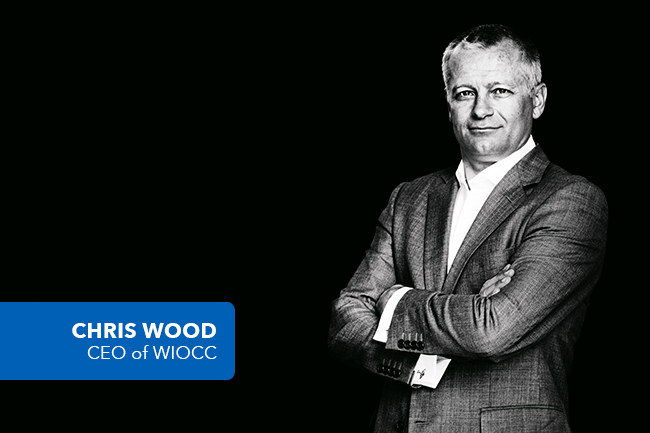The West Indian Ocean Cable Company (WIOCC) delivers internet connectivity to more than 550 loca-tions across 30 African countries and to many more countries globally. It utilises more than 50 000 km of terrestrial fibre and at least 60 000 km of submarine fibre-optic cable to deliver capacity to some of Africa’s leading telcos and internet service providers (ISPs), as well as to global carriers, over-the-top (OTT) players and content providers operating in Africa. No wonder, then, that WIOCC CEO Chris Wood has been named among the Global Telecoms Business Power 100 for the past six years in a row.
Not that he’s paying too much attention to the label. ‘I take it with a pinch of salt, to be honest,’ he says. ‘Obviously it’s nice to be on such a list, but in my mind it’s more about recognising the value that the whole WIOCC team has created over the years. It’s recog- nition of the company’s success, which is down to a lot more than just me as the CEO.’
Still, there’s no denying the key role Wood has played in leading WIOCC since start-up in 2008, building the capacity wholesaler into Africa’s premier supplier of seamless, end-to-end managed service solutions outside and within the continent. WIOCC’s growth has tracked the phenomenal expansion – and the series of disruptive innovations and changes – in the global telecoms industry.
The secret to keeping ahead of those changes? It’s simple, says Wood. ‘Hire the right people. If you get the right people and you let them do their jobs, a lot of it looks after itself. Yes, there is a lot of change, but as a leader part of my job is to spot the trends, keep ahead of the curve, and make sure that we position the company to be able to adapt to the change.’
Here Wood points to WIOCC’s agility and speed of implementation as two of the factors behind its success. ‘Fast decision-making is key to working in a changing market,’ he says. ‘When we decide to do something, we do it very quickly. That’s enabled us to keep pace with the change. If you spend too long trying to make decisions, you can get yourself in a position where you’re left behind.’
WIOCC is jointly owned by 14 major African telcos, all of which are leading operators in their respective markets – from Uganda Telecom and Telkom Kenya to Tanzania’s Zantel, Libya’s LPTIC and Botswana’s BoFiNet. So how does Wood as CEO manage all the various – and, in some cases, competing – interests?
‘The telecoms industry is actually a pretty incestuous business,’ he says. ‘Everybody is your customer, shareholder, competitor, partner, supplier… Over the years you get to know how to work in that kind of environment. It’s a very collaborative industry in many ways.
‘Our biggest competitors are sometimes both our partners and our suppliers, so you have to work with everybody. You can’t work in isolation and think you’re going to build it all. You’re always going to need to have partnerships.’
Regarding the 14 telcos that make up the WIOCC board, Wood says: ‘They’re all very different. We have a range of government-owned telcos, privately-owned telcos, global telcos and pan-African telcos, all sitting in the same room. Sometimes it is a challenge to get everybody moving in the same direction, but to their credit, over the past nine years I can only remember a couple of times when there’s been real disagreement in the board. Generally, it’s a very productive and well-run boardroom, and everybody works together to deliver the success that WIOCC has achieved.’
When the company launched in 2008, there were about 51 million internet users in Africa. Today there are more than 353 million – an explosion in internet penetration that has forced Africa’s telcos and ISPs to keep pace with massive changes. ‘But the market in Africa doesn’t exist in a vacuum,’ says Wood.
‘It exists within the global ICT market. To an extent, African development has followed similar paths to other parts of the world that enjoyed high connectivity rates much earlier than we did. Over the next few years, the volumes that we see will be orders of magnitude greater than they are today. I think we’re really only scratching the surface at the moment in terms of capacity utilisation.’
Wood predicts huge increases in volumes of African internet traffic in the coming year, and a shift from many smaller users to a concentration of big OTT content players. ‘In recent months and years, we’ve seen the likes of Google, Microsoft, Netflix, Amazon and Facebook all coming to Africa, and I think they will be driving the growth in the next few years, rather than small companies,’ he says.
‘As a company that focuses on delivering carrier-scale supporting infrastructure, WIOCC is well placed to work with these bigger players. It’s another exciting chapter in the development of African infrastructure.’



